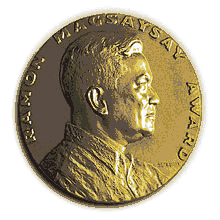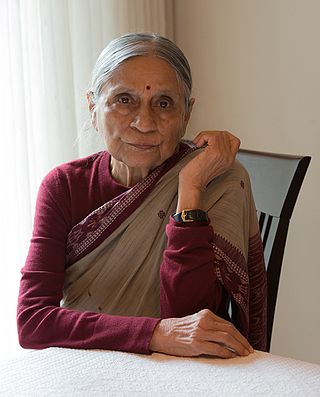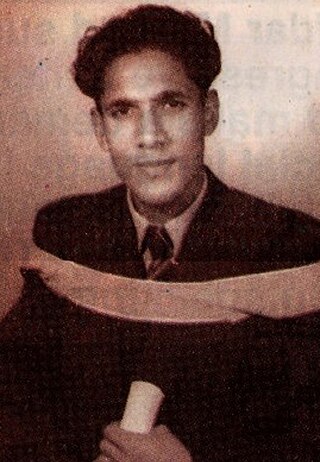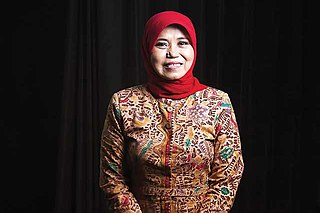
The Ramon Magsaysay Award is an annual award established to perpetuate former Philippine President Ramon Magsaysay's example of integrity in governance, courageous service to the people, and pragmatic idealism within a democratic society. The prize was established in April 1957 by the trustees of the Rockefeller Brothers Fund based in New York City with the concurrence of the Philippine government. It is often called the "Nobel Prize of Asia".

The International Rice Research Institute (IRRI) is an international agricultural research and training organization with its headquarters in Los Baños, Laguna, in the Philippines, and offices in seventeen countries. IRRI is known for its work in developing rice varieties that contributed to the Green Revolution in the 1960s which preempted the famine in Asia.

Ela Ramesh Bhatt was an Indian cooperative organiser, activist and Gandhian, who founded the Self-Employed Women's Association of India (SEWA) in 1972, and served as its general secretary from 1972 to 1996. She was the chancellor of the Gujarat Vidyapith from 7 March 2015 to 19 October 2022. A lawyer by training, Bhatt was a part of the international labour, cooperative, women, and micro-finance movements and won several national and international awards, including the Ramon Magsaysay Award (1977), Right Livelihood Award (1984) for "helping home-based producers to organise for their welfare and self-respect" and the Padma Bhushan (1986).

Manibhai Bhimbhai Desai was an Indian social activist, associate of Mahatma Gandhi, and a pioneer of rural development.
Banoo Jehangir Coyaji was an Indian physician and activist in family planning and population control. She was director of King Edward Memorial Hospital in Pune, and started programmes of community health workers in rural areas of Maharashtra, the third largest state in India. She became an advisor to the union government and an internationally recognised expert.

Harish Hande is an Indian social entrepreneur, who co-founded SELCO India in 1995.

Mahabir Pun is a Nepali researcher, teacher, social entrepreneur and an activist known for his work in applying wireless technologies to develop remote areas of the Himalayas, also known as the Nepal Wireless Networking Project. He is a widely known figure in Nepal, and his work has been recognised by the Ashoka Foundation, the Ramon Magsaysay Foundation, University of Nebraska at Kearney, and Global Ideas Bank.

Aniceto Guterres Lopes is an East Timorese politician and human rights lawyer.

Prema Gopalan was an Indian social activist. She co-founded the Society for the Promotion of Area Resource Centers (SPARC) in 1984. She then founded and has been executive director of Swayam Shikshan Prayog (SSP) for over 20 years, supporting poor rural women in entrepreneurial schemes. She is also well known for disaster relief work in Bihar, Gujarat, Kerala, Maharashtra and Tamil Nadu. Gopalan has received awards from the United Nations Framework Convention on Climate Change and the United Nations Development Programme. She died on 29 March 2022 after a short illness at the age of 66.

Deep Joshi is an Indian social worker and NGO activist and a recipient of the Magsaysay award in 2009. He is recognised for his leadership in bringing professionalism to the NGO movement in India. He co-founded a non-profit organisation, Professional Assistance for Development Action (PRADAN), of which he was the Executive Director till 2007. He was awarded the 2009 Magsaysay award for Community Leadership for his work for "development of rural communities". He is also a recipient of the civilian honour of Padma Shri.

Chetna Gala Sinha is an Indian social entrepreneur working to empower women in areas of rural India by teaching entrepreneurial skills, access to land and means of production.

Sanduk Ruit is an ophthalmologist from Nepal who was involved to restore the sight of over 180,000 people across Africa and Asia using small-incision cataract surgery.

Bezwada Wilson is an Indian activist and one of the founders and National Convenor of the Safai Karmachari Andolan (SKA), an Indian human rights organization that has been campaigning for the eradication of manual scavenging, the construction, operation and employment of manual scavengers which has been illegal in India since 1993. His work at SKA, a community-driven movement, has been recognized by the Ashoka Foundation which has nominated him a Senior Fellow. On 27 July 2016, he was honoured with the Ramon Magsaysay Award. He is an Ambedkarite.

Shoaib Sultan Khan NI is one of the pioneers of rural development programmes in Pakistan. As a CSP Officer, he worked with the Government of Pakistan for 25 years, later on he served Geneva based Aga Khan Foundation for 12 years, then UNICEF and UNDP for 14 years. Since his retirement, he has been involved with the Rural Support Programmes (RSPs) of Pakistan full-time, on voluntary basis. Today, the Rural Support Programmes have helped form 297,000 community organisations in 110 districts including two Federally Administered Tribal Areas of Pakistan.
Nidan is a non governmental organization which facilitates empowerment of the poor and marginalized sectors through community services and pro-poor participative interventions. Nidan has been intensively working with the people employed in unorganized sector in the states of Bihar, Rajasthan, Delhi and Jharkhand. It has two head offices located in Patna and West Vinod Nagar.

Albina Ruiz Ríos is a Peruvian environmentalist, social activist and social entrepreneur who served as the minister of environment of Peru from 10 December 2022 until 13 February 2024.

Tri Mumpuni, also known as Bu Puni is an independent researcher, social entrepreneur, philanthropist, social activist, and micro-hydropower inventor who was involved in the project for the development of hydro power electricity for more than half a million people in Indonesia. In 2010 she was elected as board member of National Committee on Innovation. For her work she was awarded the prestigious Ramon Magsaysay Award in 2011. On 13 October 2021, she was appointed a Member of the National Research and Innovation Agency (BRIN) Steering Committee by Joko Widodo.

Goonj is a non-governmental organisation headquartered in New Delhi, India. Goonj is working to bring equity and dignity between cities and villages using underutilised urban material particularly cloth as a tool for development across the country. Goonj undertakes disaster relief, humanitarian aid and community development in parts of 23 states across India. It focuses on clothing as a basic but unaddressed need.

Runa Khan is a Bangladeshi social entrepreneur and the founder and executive director of Friendship NGO. Friendship is based on Khan's model of "integrated development," meaning it addresses problems in multiple sectors, including health, education, disaster management and economic development in communities where it is involved, rather than specializing in one of these. Khan won the Rolex Awards for Enterprise in 2006 for work through Friendship to preserve the declining craft of traditional boat building in Bangladesh.
Harsh Mariwala is an Indian entrepreneur, who is the founder and Chairman of Marico, a Fortune India 500 company from Gujarat.

















